|
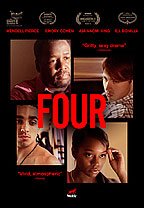
Four
Wolfe Video,
2012
Director/Screenplay:
Joshua Sanchez
Starring;
Wendell Pierce,
Emory Cohen,
Aja Naomi King,
E.J. Bonilla,
Yolonda Ross,
Liam Benzvi,
Kathryn Meisle
Rated R,
75 minutes |
Only The Lonely
by
Michael D. Klemm
Posted online February, 2014
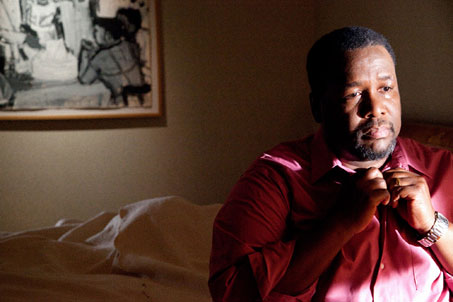
Wendell Pierce (HBO’s The Wire) leads an outstanding ensemble cast in writer/director Joshua Sanchez’s feature film debut, Four (2012). Based on the 1996 play by Christopher Shinn, Four tells a story of urban loneliness by way of two clandestine sexual trysts, one gay and one straight, and the connections that tie all four of the principals together. |
 June (Emory Cohen) is a closeted, white teen who hooks up with a man he met on the internet. June’s age is left vague; he’s probably a college student but looks can be deceiving and he could also still be in high school. His chatroom date is much older. Joe (Pierce) is a stocky, middle-aged black man. They meet by a payphone in front of an abandoned storefront. June is understandably nervous but, after a few awkward hellos, he gets into the stranger’s car. June (Emory Cohen) is a closeted, white teen who hooks up with a man he met on the internet. June’s age is left vague; he’s probably a college student but looks can be deceiving and he could also still be in high school. His chatroom date is much older. Joe (Pierce) is a stocky, middle-aged black man. They meet by a payphone in front of an abandoned storefront. June is understandably nervous but, after a few awkward hellos, he gets into the stranger’s car.
|
|
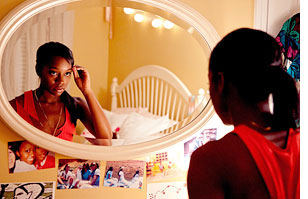 Joe, it turns out, is married. His teenaged daughter, Abigayle (Aja Naomi King), is home, looking after her sick mother while dad is away on a “business trip.” She has no idea that her father is actually on the down low. Abigayle is restless, like her father, and wants to go out. Her boyfriend, Dexter, (E.J. Bonilla), is 19 and cocky. When we first see him he is admiring his muscles in the mirror and snorting drugs. Like most teens, he is hoping to get laid before the night is over. The film’s opening scenes establish, with minimalist strokes, the four main characters and their relationships. June ducks away from his family’s Fourth of July party, ostensibly to watch fireworks with friends. Joe is driving his car to meet him. He talks to his daughter on his cellphone, who then calls her boyfriend and asks him to come over and pick her up. Joe, it turns out, is married. His teenaged daughter, Abigayle (Aja Naomi King), is home, looking after her sick mother while dad is away on a “business trip.” She has no idea that her father is actually on the down low. Abigayle is restless, like her father, and wants to go out. Her boyfriend, Dexter, (E.J. Bonilla), is 19 and cocky. When we first see him he is admiring his muscles in the mirror and snorting drugs. Like most teens, he is hoping to get laid before the night is over. The film’s opening scenes establish, with minimalist strokes, the four main characters and their relationships. June ducks away from his family’s Fourth of July party, ostensibly to watch fireworks with friends. Joe is driving his car to meet him. He talks to his daughter on his cellphone, who then calls her boyfriend and asks him to come over and pick her up.
|
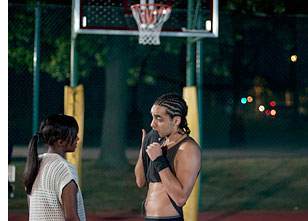 The films cuts back and forth between each couple’s meetings and assignations. Joe and June drive around, and Abigayle and Dexter do the same. They talk and, because both June and Abigayle are a bit apprehensive, their silences are pregnant with meaning. June evades Joe’s questions and then finally admits that he is just starting to come to terms with being gay, that his parents have no idea, and that he never plans to tell them. Joe was a young man during the 80s and, presumably, thought he was doing “the right thing” by getting married. Joe, no stranger to the closet, attempts to give fatherly advice and counsels the lad to be true to himself and his loved ones. The men go to a movie. Abigayle watches Dexter shoot basketballs. Dexter flirts, she plays hard to get, and then surprises him by making the first move and kissing him. Joe takes June to a motel, Abigayle follows Dexter home. Both June and Abigayle think this is what they want and each seems to regret the sex afterwards. The films cuts back and forth between each couple’s meetings and assignations. Joe and June drive around, and Abigayle and Dexter do the same. They talk and, because both June and Abigayle are a bit apprehensive, their silences are pregnant with meaning. June evades Joe’s questions and then finally admits that he is just starting to come to terms with being gay, that his parents have no idea, and that he never plans to tell them. Joe was a young man during the 80s and, presumably, thought he was doing “the right thing” by getting married. Joe, no stranger to the closet, attempts to give fatherly advice and counsels the lad to be true to himself and his loved ones. The men go to a movie. Abigayle watches Dexter shoot basketballs. Dexter flirts, she plays hard to get, and then surprises him by making the first move and kissing him. Joe takes June to a motel, Abigayle follows Dexter home. Both June and Abigayle think this is what they want and each seems to regret the sex afterwards. |
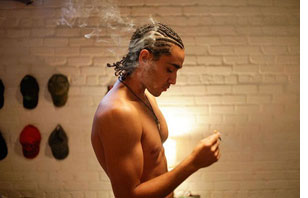 Along the way, Four examines issues of sexuality, age, race, and class. To June’s credit, he doesn’t seem bothered in the least that his hookup is African-American or that he’s old enough to be his father. Race and class will come more into play as Joe’s daughter and her paramour reveal more about themselves. Dexter might have what it takes to play college basketball but his grades aren’t good enough and so he thinks he is not good enough for her, (seeing the middle class Abigayle as a rich girl). The streetwise Dexter is half black and half Hispanic. “I talk like I’m black,” he says, “You talk like a white girl.” She becomes annoyed when he calls her “beautiful chocolate.” Abigayle is fascinated and stand-offish with him. Just like June, she doesn’t know what she wants but, like many other lonely people, will engage in risky behavior to find out. Bored, and tired of looking after her mother, she’s attracted to both the mystery and the danger represented by this sexy young man. Along the way, Four examines issues of sexuality, age, race, and class. To June’s credit, he doesn’t seem bothered in the least that his hookup is African-American or that he’s old enough to be his father. Race and class will come more into play as Joe’s daughter and her paramour reveal more about themselves. Dexter might have what it takes to play college basketball but his grades aren’t good enough and so he thinks he is not good enough for her, (seeing the middle class Abigayle as a rich girl). The streetwise Dexter is half black and half Hispanic. “I talk like I’m black,” he says, “You talk like a white girl.” She becomes annoyed when he calls her “beautiful chocolate.” Abigayle is fascinated and stand-offish with him. Just like June, she doesn’t know what she wants but, like many other lonely people, will engage in risky behavior to find out. Bored, and tired of looking after her mother, she’s attracted to both the mystery and the danger represented by this sexy young man.
|
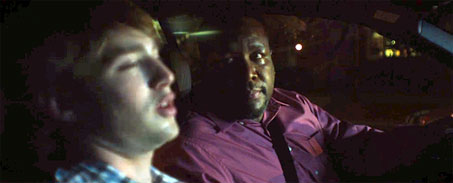
|
Danger is made explicit when Joe remarks, casually, to June that they are “breaking the law.” He then clarifies the offending “crime” as adultery – as there are laws against it in their state. June asks, “Are we having an affair?” Calling their tryst illegal might raise red flags for viewers as this brings up the issue of age. Joe seems like a kindly man. He takes the time to mentor the lad and he doesn’t force himself on him. But he is a married man who is cheating on his wife and, because the film never explicitly states June’s age, my judgment of the man is further clouded because of the possibility that he is having sex with a minor (no matter how willing). |
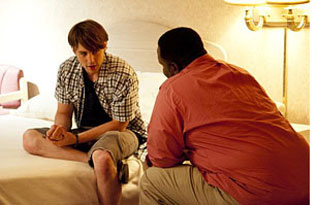 The whole film changes for me if I imagine June as being at least 18 in one version, and then 17 in the other. I watched the film a second time to listen for his age, but the filmmaker is being maddeningly vague on this point. What does Joe mean when he says what they are doing is illegal? Many mainstream reviewers seemed to assume that Joe is robbing the cradle. All were generous with praise for Pierce’s “brave” performance and used words like “creepy” to describe the scene in the motel. I just read a snippet online where Pierce is quoted as saying that his character is a pedophile. The presence of controversial playwright and screenwriter, Neal Labute, as one of the producers might also suggest such a reading. Maybe I am belaboring the point, but I wish this rather important bit of information was included in the film somewhere. June’s age would change my whole perception of Joe drastically. The whole film changes for me if I imagine June as being at least 18 in one version, and then 17 in the other. I watched the film a second time to listen for his age, but the filmmaker is being maddeningly vague on this point. What does Joe mean when he says what they are doing is illegal? Many mainstream reviewers seemed to assume that Joe is robbing the cradle. All were generous with praise for Pierce’s “brave” performance and used words like “creepy” to describe the scene in the motel. I just read a snippet online where Pierce is quoted as saying that his character is a pedophile. The presence of controversial playwright and screenwriter, Neal Labute, as one of the producers might also suggest such a reading. Maybe I am belaboring the point, but I wish this rather important bit of information was included in the film somewhere. June’s age would change my whole perception of Joe drastically.
|
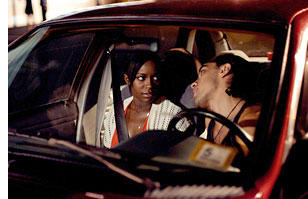 However, in some ways this makes the film more interesting. In fact, there are many things that are left unsaid and it is when you think about these things that the film grows richer in meaning. What is wrong, for example, with Joe’s wife? She’s “sick” and someone has to stay home and look after her. The clearest explanation of her malady comes when Abigayle tells Dexter that “she got weak.” Could it be depression because she knows that her husband is really queer? Abigayle, while driving with Dexter, is devastated when she sees her father and realizes that he was lying about the business trip. We never get to see her confront him about this before the film ends, but one gets the feeling that there is punishment in store for his assignation with the young man, whatever his age. However, in some ways this makes the film more interesting. In fact, there are many things that are left unsaid and it is when you think about these things that the film grows richer in meaning. What is wrong, for example, with Joe’s wife? She’s “sick” and someone has to stay home and look after her. The clearest explanation of her malady comes when Abigayle tells Dexter that “she got weak.” Could it be depression because she knows that her husband is really queer? Abigayle, while driving with Dexter, is devastated when she sees her father and realizes that he was lying about the business trip. We never get to see her confront him about this before the film ends, but one gets the feeling that there is punishment in store for his assignation with the young man, whatever his age.
|
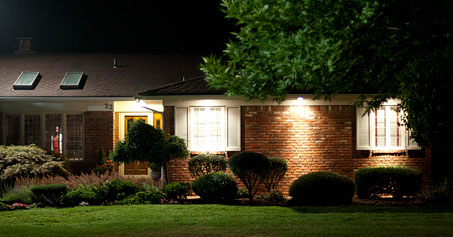 |
I’d like to think that Joe and June’s story isn't a modern take on Nabokov’s Lolita but, regardless, audiences will still probably view Joe as a predator. Whether June is underaged or not, in either scenario there still remains the “ew” factor most people feel when watching a middle-aged “lecher” seducing such a younger man. It’s worth noting that we never learn how old Abigayle is either. |
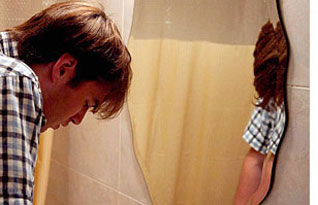 Human behavior is complicated; there would be no such thing as drama otherwise. Joe’s character is rife with contradictions - his kindness, for example, being offset by how he deceives his family. His enthusiasm for all things American includes shooting off fireworks (another illegal activity). While trying to reassure his nervous companion, he launches into a somewhat disturbing speech about how AIDS made gay men more human because they had to think about sex instead of just having it, and compares a gay man’s first AIDS test to a straight boy losing his virginity. I’m not sure how this bizarre monologue was supposed to put Joe at ease but he seems to just want to help the young man (and get laid in the process). Dexter will also reveal nuances of character when his gift to Abigayle, a family photo that he prizes above all else, is rejected. Human behavior is complicated; there would be no such thing as drama otherwise. Joe’s character is rife with contradictions - his kindness, for example, being offset by how he deceives his family. His enthusiasm for all things American includes shooting off fireworks (another illegal activity). While trying to reassure his nervous companion, he launches into a somewhat disturbing speech about how AIDS made gay men more human because they had to think about sex instead of just having it, and compares a gay man’s first AIDS test to a straight boy losing his virginity. I’m not sure how this bizarre monologue was supposed to put Joe at ease but he seems to just want to help the young man (and get laid in the process). Dexter will also reveal nuances of character when his gift to Abigayle, a family photo that he prizes above all else, is rejected.
|
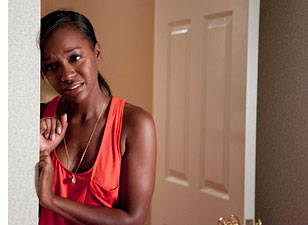 Four is a beautiful little film, subtle with layers and layers of meaning that are revealed slowly. The handheld camera gets up close and the results are sometimes visceral. The director cites early Cassavetes as an influence and the less-is-more approach works well. Amplifying the bravura performances are ample close-ups of faces that are virtual roadmaps of emotion; a facial tic often speaks a thousand words. This is a troupe of actors who understand subtlety and their craft doesn’t rely on histrionics. The film is beautifully shot in widescreen with compositions that emphasize the characters’ loneliness and detachment. The music is understated; often just one melancholy chord. Four is a beautiful little film, subtle with layers and layers of meaning that are revealed slowly. The handheld camera gets up close and the results are sometimes visceral. The director cites early Cassavetes as an influence and the less-is-more approach works well. Amplifying the bravura performances are ample close-ups of faces that are virtual roadmaps of emotion; a facial tic often speaks a thousand words. This is a troupe of actors who understand subtlety and their craft doesn’t rely on histrionics. The film is beautifully shot in widescreen with compositions that emphasize the characters’ loneliness and detachment. The music is understated; often just one melancholy chord.
|
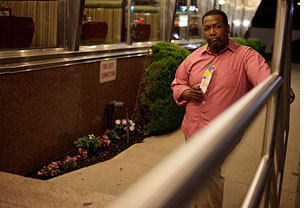 In its quiet way, Four packs quite a wallop into only 75 minutes of film. When Joe realizes how alone June is, and he tells him that he needs “someone to make [him] feel real,” one gets the impression that he is trying to give the lad the life that he never had himself. Joe gets what he wants, as does Dexter, but at what cost? And everyone is still empty afterwards. By avoiding the truth, we hide from ourselves, becoming virtually invisible in our solitude. In its quiet way, Four packs quite a wallop into only 75 minutes of film. When Joe realizes how alone June is, and he tells him that he needs “someone to make [him] feel real,” one gets the impression that he is trying to give the lad the life that he never had himself. Joe gets what he wants, as does Dexter, but at what cost? And everyone is still empty afterwards. By avoiding the truth, we hide from ourselves, becoming virtually invisible in our solitude.
|


 The films cuts back and forth between each couple’s meetings and assignations. Joe and June drive around, and Abigayle and Dexter do the same. They talk and, because both June and Abigayle are a bit apprehensive, their silences are pregnant with meaning. June evades Joe’s questions and then finally admits that he is just starting to come to terms with being gay, that his parents have no idea, and that he never plans to tell them. Joe was a young man during the 80s and, presumably, thought he was doing “the right thing” by getting married. Joe, no stranger to the closet, attempts to give fatherly advice and counsels the lad to be true to himself and his loved ones. The men go to a movie. Abigayle watches Dexter shoot basketballs. Dexter flirts, she plays hard to get, and then surprises him by making the first move and kissing him. Joe takes June to a motel, Abigayle follows Dexter home. Both June and Abigayle think this is what they want and each seems to regret the sex afterwards.
The films cuts back and forth between each couple’s meetings and assignations. Joe and June drive around, and Abigayle and Dexter do the same. They talk and, because both June and Abigayle are a bit apprehensive, their silences are pregnant with meaning. June evades Joe’s questions and then finally admits that he is just starting to come to terms with being gay, that his parents have no idea, and that he never plans to tell them. Joe was a young man during the 80s and, presumably, thought he was doing “the right thing” by getting married. Joe, no stranger to the closet, attempts to give fatherly advice and counsels the lad to be true to himself and his loved ones. The men go to a movie. Abigayle watches Dexter shoot basketballs. Dexter flirts, she plays hard to get, and then surprises him by making the first move and kissing him. Joe takes June to a motel, Abigayle follows Dexter home. Both June and Abigayle think this is what they want and each seems to regret the sex afterwards.